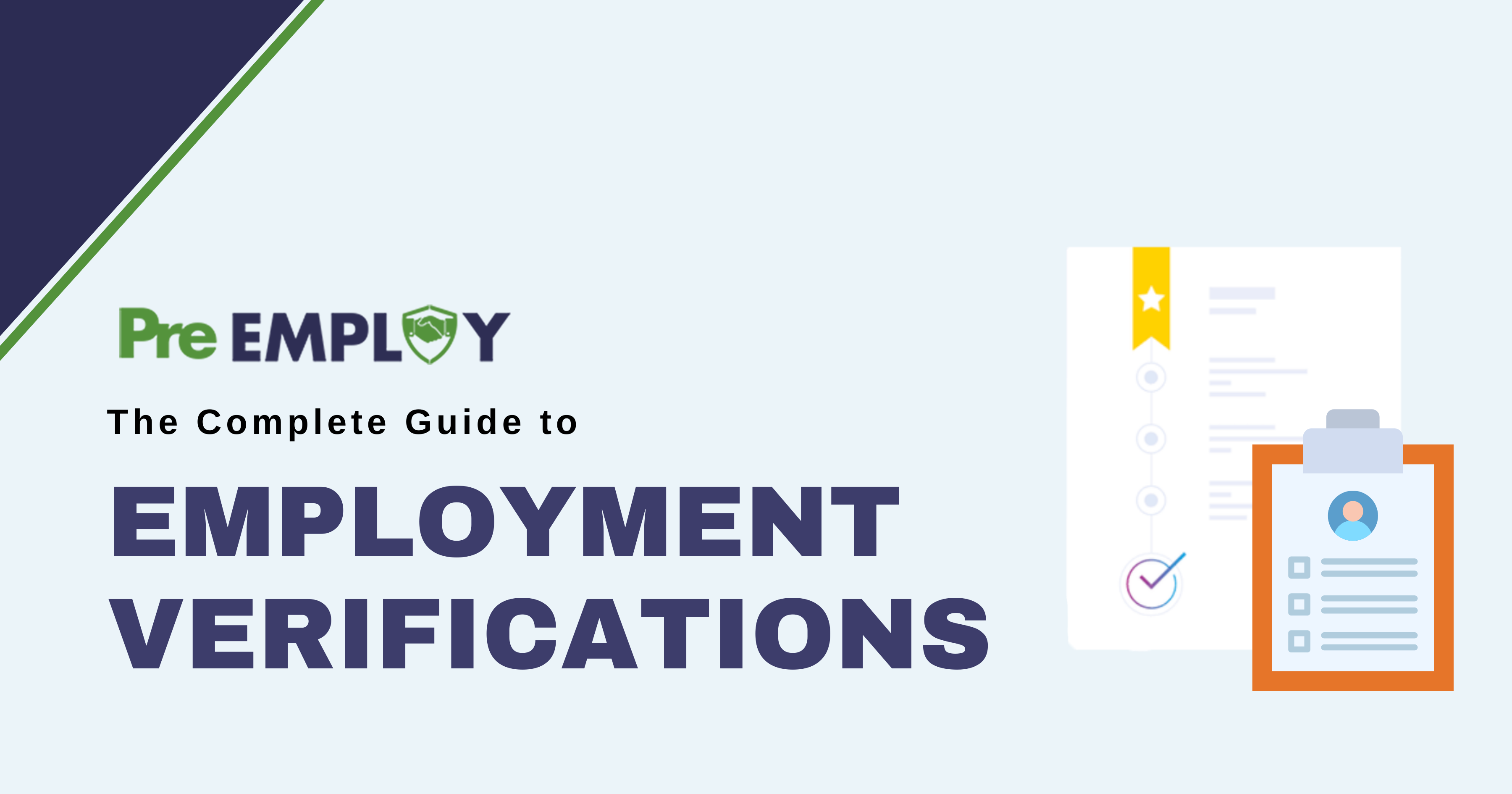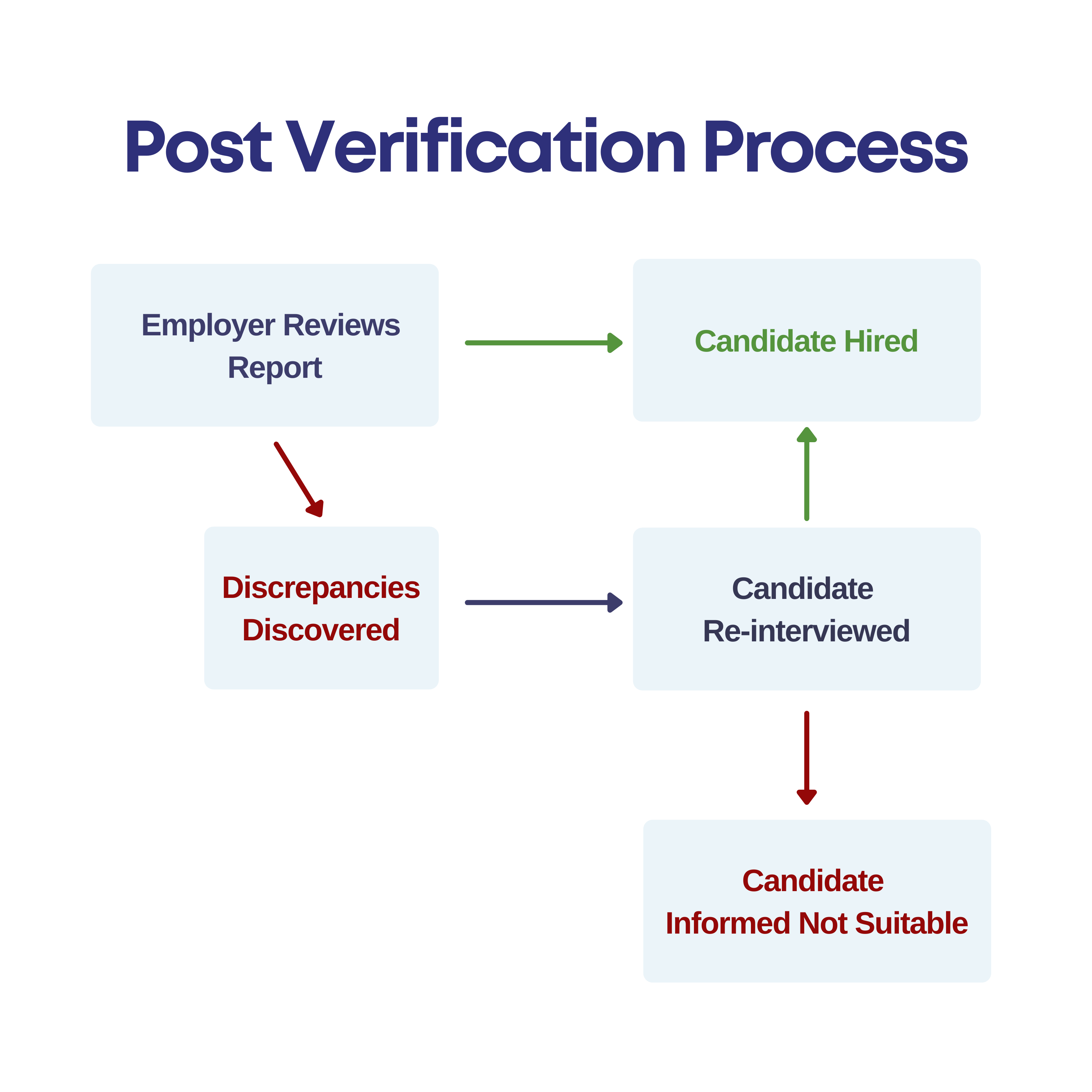The Complete Guide to Employment Verifications [2022]

When hiring new employees for your business, you will probably look at many applications and resumes for every open position. Doing this gives you a great opportunity to check many candidates’ skills, education, and experience to see who might be suitable for the positions for which you are hiring but what if they are making up this experience? This is where employment verifications come into play.
Studies have found that an estimated 40% of individuals applying for jobs lie on their resumes. So, as we like to call it “Trust but verify” because depending on an applicant’s honesty when choosing your future employees puts you and your team at risk.
Instead, you can verify the work history of an applicant with a fast and accurate process.
Employment verification is a way of substantiating the employment history of a job applicant. This will allow you to make sure an applicant has the experience you believe is necessary to excel at the position they are applying for. Additionally, employment verifications will show any gaps in an applicant’s employment along with any false claims of jobs or job titles.
They are also a way of seeing if a potential employee is honest or not. If you do find discrepancies on their resume, you can decide whether or not you feel they would be a suitable employee for your business.
There are three different ways to conduct employment verification – with varying effort and success.
Choose a Background Check Company to Conduct the Search
This is the easiest and most common option for conducting employment verifications on applicants. The company that conducts your pre-employment background checks will offer this service and it is easy to add to your current package. Like any pre-employment background check, you’ll need to make sure you comply with the Fair Credit Reporting Act (FCRA). This means you’ll need to provide them with any disclosures required, such as the name of the background check company you will be using (your background check company can assist). Additionally, you’ll need to obtain their permission to run a background check.
Once you obtain the applicant’s permission to run the background check, the background check company should be able to handle the process as long as you pick a reputable, experienced background check company. It is the job of a background check company to stay up to date on all relevant federal, state, and local laws and regulations and thus be able to conduct the background check and employment verification while complying with these laws and regulations.
Manually Using the Work Number® Database
Another way to conduct an employment verification is to use the Work Number Database. Equifax owns this database, and it contains information from over 1.2 million employers. Some employers can directly request employment verification from this database. However, not all employers can do this. Some employers will need to use a third-party background check company who will then be able to access this database. This is typically less cost-effective as pricing varies based on the number of verifications being done, so companies like Pre-employ who do many every day will be able to provide clients with lower prices.
Conduct the Employment Verification Yourself
The third way to conduct an employment verification is to do it yourself, and this isn’t always easy. It can be especially difficult for an employee that has a long employment history because conducting the verification yourself means that you or one of your employees will need to check with every employer the applicant has had. To verify an applicant’s past employment, you’ll need to:
- Use the applicant’s resume to obtain the names of previous employers.
- Call each of the applicant’s previous employers using a phone number that you have obtained on your own.
- Verify the applicant’s employment dates and job titles with the employer.
This may be even more difficult if an employer refers you to a third-party verification provider that they use. This would probably require you to sign up for the service and pay a fee before receiving the employment verification. This service requires FCRA compliance and will require you to obtain signed permission from the applicant before giving you the requested information. This is not typically recommended as the compliance risk and effort are fairly high.
The federal government does not have any laws pertaining to the information an employer is allowed to supply about a previous employee. However, some states do have laws that restrict the information an employer is allowed to share.
Here are some items that a typical employment verification might supply:
- Reasons for dismissal
- Job title
- Dates of employment
- Wage history (if allowed by state laws)
- Job description
You might consider obtaining legal counsel to ensure you obey state laws during the process. Also, avoid asking for any information you don’t intend to use.
For those who conduct the search themselves, the completion time could vary considerably. It would depend on the number of applicants you choose to screen, the number of employees conducting the verifications, how long the applicant’s job history is, as well as how hard it is to contact the candidates’ previous employers and obtain the information. It could take several weeks to do this, by which time an applicant may have found another job. If you choose to use a third-party background check company, it could take less than a week.
Background checks are generally only allowed to cover seven years of criminal history although these restrictions do not typically apply to employment verifications. The Federal Trade Commission considers employment verifications to be neutral, meaning that the information they contain is not positive or negative. For this reason, there are no restrictions on the time period the verification can cover. So, any job that an applicant or employee has had can be included in the report.
Not all employers will verify a candidate’s previous employment history, but most will. It is a good idea for employers to confirm the information an applicant puts on their resume or application since so many people lie on their resume. This could save your business time and money since you will have to provide more training if an employee does not have the experience or training they claimed on their resume.
Should you choose to run a background check on an applicant, employment verification will likely be included. Conducting both of these checks will allow you to find out more about your candidate.
If you aren’t able to verify an applicant’s employment history, there are other options for obtaining this information.
If you hired a background check company to do the employment verification, they might ask for copies of the applicant’s paystubs or W-2s for each year that the applicant was employed at their previous jobs. The documents will then likely be checked to ensure they are legitimate. Generally, background check companies are able to complete employment verifications in a reasonable amount of time.
If you are handling the employment verification yourself and are having difficulty contacting a candidate’s previous employer, you could ask the applicant to contact the business or to help you contact a specific person in the company.
The law does allow past employers to verify employment. But, states often have laws that limit the information an employer is allowed to share about their employees. This makes it essential to know the laws in your state concerning this situation.
It is common for employers to be requested to verify the employment of present or past employees by government agencies, collection agencies, potential employers, and others. But, employers are not always required to respond to these requests.
Businesses should ensure that they only provide information about employees that can be supported. Additionally, potential employers should make sure to obtain an applicant’s consent before conducting employment verification.
Employers who receive requests to verify the employment of present or past employees should make sure they know their state’s law concerning what information they are allowed to share about their employees. Employers should also be very careful to state only truthful information that can be backed up about any employee or former employee to avoid possible defamation lawsuits.
If an employer receives a request from the federal or state government to verify the employment of an employee, they are usually obligated to respond to the request. However, employers are not required to respond to collection agencies or anyone else asking for employment verification.
If you ask a past employer for the information of an applicant, the past employer may not supply the information. If the employer does choose to provide the information, they may only include the employee’s dates of employment and their job title or position. A number of states don’t allow past employers to provide salary history information or allow prospective employers to ask for it.
An employer needs to verify if an individual is eligible to be employed in the United States before they can legally hire the individual. If an employer does not verify the employment eligibility of all of their employees or if they accept fraudulent documents in order to hire ineligible employees, they could be subject to penalties or fines.
Employers could face criminal penalties as well as civil penalties if they fail to verify the employment eligibility of the workers they hire and end up hiring workers who are not authorized to work in the U.S. If an employer violates I-9 rules or intentionally hires, recruits, or refers an unauthorized employee for a job for a fee, they could receive fines of up to several thousand dollars per violation.

If a federal contractor violates the laws to verify employees’ eligibility to work in the U.S., then the contractor could be forbidden from obtaining federal contracts in the future. If it is mandatory for an employer to participate in E-verify, but they neglect to do so, they could also be audited by Immigration and Customs Enforcement.
Although it is absolutely necessary for you to ensure your business does not hire someone who is not authorized to work in the U.S., you must also be careful not to discriminate against applicants who are authorized to be employed in the U.S. If an employer discriminates against an authorized candidate, the following penalties may apply:
- Civil fines
- An order to pay back-pay to any applicant who you discriminated against
- Criminal fines for a history of repeated offenses
- An order that requires the employer to hire the candidate they discriminated against
- Disqualification from government contracts in the future
Employment verification prices have increased significantly [Read More: What we know about Employment Verifications Price Increase] but while other background check companies have passed on this increase to their clients Pre-employ has not. We are committed to providing the best verification screenings at reasonable prices.
Beyond employment verifications, Pre-employ offers everything you need in background check services to run high-quality background checks with great service. If you would like to learn how Pre-employ can help, click here to schedule your organization’s free assessment.
